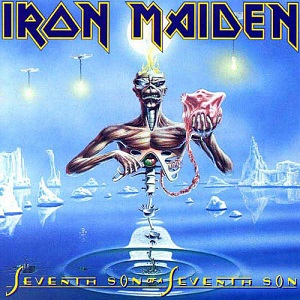Seventh Son of a Seventh Son by Iron Maiden
Buy Seventh Son of a Seventh Son
 One of Iron Maiden’s most popular albums, Seventh Son of a Seventh Son has the dual properties of being the last of their “classic” era and the first release to prominently feature a progressive metal arrangement and include keyboards. This concept album features lyrics that are based on supernatural mysticism and English folklore and the title and theme worked well as the group’s seventh overall album. Seventh Son of a Seventh Son reached the Top 20 in the U.S. and #1 on the U.K. Album Charts, their first to do so since 1982’s The Number of the Beast. The album also spawned four Top 10 singles on the U.K. charts.
One of Iron Maiden’s most popular albums, Seventh Son of a Seventh Son has the dual properties of being the last of their “classic” era and the first release to prominently feature a progressive metal arrangement and include keyboards. This concept album features lyrics that are based on supernatural mysticism and English folklore and the title and theme worked well as the group’s seventh overall album. Seventh Son of a Seventh Son reached the Top 20 in the U.S. and #1 on the U.K. Album Charts, their first to do so since 1982’s The Number of the Beast. The album also spawned four Top 10 singles on the U.K. charts.
Musically, the album is led by guitarist Adrian Smith and contains traditional prog-rock arrangements with stop/start transitions between riffs, tempos, and time signatures along with strong and memorable vocal hooks by lead vocalist Bruce Dickinson. They built on the guitar synths introduced on their previous album Somewhere in Time in 1986 towards full keyboard synthesizers.
Bassist Steve Harris came up with the album title and theme after he read Orson Scott Card’s Seventh Son and realized this was to be Iron Maiden’s seventh studio album. Dickinson revised his earlier role of providing most lyrics with much collaboration among the band members who “checked up on each other to see what everybody else was up to”.
 Seventh Son of a Seventh Son by Iron Maiden |
|
|---|---|
| Released: April 11, 1988 (EMI) Produced by: Martin Birch Recorded: Musicland Studios, Munich, Germany, February-March 1988 |
|
| Side One | Side Two |
| Moonchild Infinite Dreams Can I Play With Madness The Evil That Men Do |
Seventh Son Of A Seventh Son The Prophecy The Clairvoyant Only The Good Die Young |
| Band Musicians | |
| Bruce Dickinson – Lead Vocals, Guitars Adrian Smith – Guitars, Synths Dave Murray – Guitars Steve Harris – Bass Nicko McBrain – Drums, Percussion |
|
The opener “Moonchild” comes in almost like a Jethro Tull acoustic song entry before quickly turning to something a bit heavier and more dynamic. The focus on the number seven is immediate in the lyrics and this is the first in the conceptual sequence of the album. “Infinite Dreams” is introduced by a chorus guitars and later contains funky bass by Harris and choppy guitars by Dave Murray during first verse but the song evolves through many sections of differing sonic intensity, getting progressively heavier towards the song’s climax and the following final verse.
“Can I Play with Madness” is the most mainstream track on the album and contains a completely different vibe than the more melodramatic efforts elsewhere. The song originated as a ballad but evolved into a more upbeat track which became the album’s first single, peaking at #3 on the U.K. charts. The extremely poppy chorus would become a sore spot for many long time fans. The strong and melodic “The Evil That Men Do” concludes the first side as a classic Iron Maiden track, complete with a great guitar lead by Smith. The song’s title was taken from Marc Anthony’s speech following Julius Caesar’s assassination.
The title song “Seventh Son of a Seventh Son” is a nearly ten minute extended piece which begins with a simple guitar/synth track but builds quickly. The interludes between the opening verses are excellent with Dickinson complementing the musical harmony. A long, prog rock middle instrumental has a consistent hi-hat by drummer Nicko McBrain guiding the way with some spoken lines at top of this section. It concludes by morphing into a full-fledge prog-influenced jam, not unlike “The Cinema Show” off Genesis’ Selling England by the Pound a decade and a half earlier.
After the tour-de-force title track, the album inevitably loses steam, although the final three tracks are all quality. “The Prophecy” begins with a softly picked guitar and long synth strings and a good, minute-long classical ending. “The Clairvoyant” begins with a raw bass by Harris, setting the pace for this enjoyable rocker, which was the catalyst for album’s concept as the first track written. “Only the Good Die Young” is an upbeat closer and, in a way, the most classic eighties metal song on the album (and therefore the least prog oriented). It contains another great harmonized guitar lead and ends with a reprise of the intro to “Moonchild” with the same “seven” theme revisited.
Following the release of Seventh Son of a Seventh Son, the band headlined the Monsters of Rock before a crowd of over 100,000. This would turn out to be the pinnacle of their success as Adrian Smith soon left the band and their fortunes and peak popularity began to deteriorate.
~
Part of Classic Rock Review’s celebration of 1988 albums.




